Reflective optics are optical systems that utilize mirrors to reflect and focus light. They involve using mirrors—smooth, reflective surfaces that alter wavefront direction. This technology is key in different applications, from everyday devices to sophisticated scientific tools.
Although all mirrors reflect light, the reflection depends on their shape and, occasionally, the length between the mirror and the object being reflected. Among high-performance optical systems, especially in precision optics, “first-surface mirrors” are favored and most widely used. They have a high-reflectance coating applied directly to the front surface of different substrates, including metal, glass, and semiconductors.
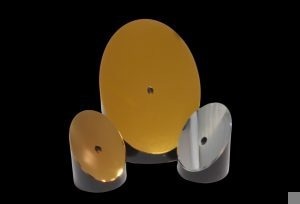
Reflective Mirrors. Image Credit: Avantier Inc.
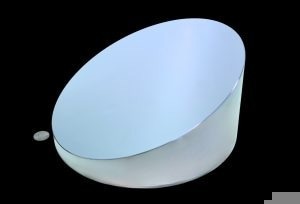
Silver Coated Mirror with aluminum base. Image Credit: Avantier Inc.
Discover High Precision Optics: Reflective Optics
Video Credit: Avantier Inc.
Key Principles
- Aberration Control: Reflective systems may be designed to reduce optical aberrations, including chromatic aberration, as they do not disperse light into its constituent colors like refractive (lens-based) systems.
- Focusing: Light can be focused onto a point or line by shaping mirrors, usually into parabolic or spherical forms. Parabolic mirrors converge parallel rays of light to one focal point.
- Reflection: Reflective optics depend on how light reflects from mirror surfaces. The angle of incidence matches the angle of reflection, permitting meticulous control over the course of light going through.
Reflective Optics Applications
- Cameras: Some high-end cameras and specialized photographic tools utilize mirror lenses.
- Laser Systems: Reflective optics are critical for use cases that involve lasers, where meticulous control over light paths is vital.
- Microscopes: Some microscopes, especially those built for infrared or ultraviolet light, use reflective optics where lenses would otherwise absorb such radiation.
- Scientific Instruments: Reflective optics are used in tools such as spectrometers and interferometers, which are utilized for comprehensive light analysis.
- Telescopes: Most modern telescopes, including Cassegrain Newtonian, utilize reflective optics to collect and focus light from faraway stars and galaxies, including the primary mirror of the James Webb Space Telescope.
Advantages
- No Chromatic Aberration: Mirrors reflect all light wavelengths equally, so reflective optics are not subjected to chromatic aberration.
- Broad Wavelength Range: Reflective systems function over various wavelengths from ultraviolet to far infrared.
- Durability: Mirrors, especially those with protective coatings, may be more robust and easier to maintain than lenses.
General Specifications of Optical Coatings
Source: Avantier Inc.
| Specifications |
| Material |
Substrate |
Surface Figure |
Surface Quality |
Chamfer |
Coating Material |
Clear Aperture |
| Copper |
Fused Silica, H-K9L, etc. |
– |
40-20 |
0.5 mm, 45° |
Ag, Al, Cr, etc. |
> 90% of diameter |
| Silver |
Fused silica, BK7 |
< λ/10 @ 632.8n m |
40-20 |
0.5 mm, 45° |
Silver |
> 85% of diameter |
| Aluminum |
Fused silica, BK7 |
< λ/10 @ 632.8 nm |
40-20 |
0.5 mm, 45° |
Aluminum |
> 85% of diameter |
| Germanium |
Germanium, ZnSe, etc. |
– |
40-20 |
0.5 mm, 45° |
ZnS, YbF3, Ge, etc. |
> 90% of diameter |
| MgF2 |
Fused Silica, H-K9L, etc. |
– |
40-20 |
0.5 mm, 45° |
Al2O3, SiO3, HfO2, Ta@O5, etc. |
> 90% of diameter |
| Gold |
Fused silica, BK7 |
< λ/10 @ 632.8 nm |
40-20 |
0.5 mm, 45° |
Gold |
> 85% of diameter |
| Chromium |
Fused silica, BK7 |
< λ/10 @ 632.8 nm |
40-20 |
0.5 mm, 45° |
Chromium |
> 85% of diameter |
| Silicon Dioxide (SiO2) |
– |
PV<λ/4 |
60-40 |
0.2 mm, 45° |
– |
>90% of diameter |
| Titanium Dioxide (TiO2) |
– |
PV<λ/4 |
60-40 |
0.2 mm, 45° |
– |
>90% of diameter |
| Fluorides |
– |
PV<λ/4 |
60-40 |
0.2 mm, 45° |
– |
>90% of diameter |
| Dielectric Coatings |
– |
PV<λ/4 |
60-40 |
0.2 mm, 45° |
– |
>90% of diameter |
* Dielectric coatings are more flexible but cannot be used over as broad a wavelength of light as metal coatings and must be designed for specific narrow spectral bands, usually in the visible and NIR regions.
Avantier’s product line ups
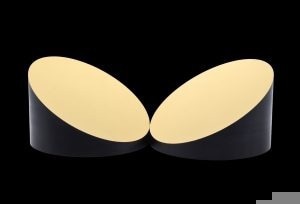
Gold Coated Mirrors with aluminum base. Image Credit: Avantier Inc.
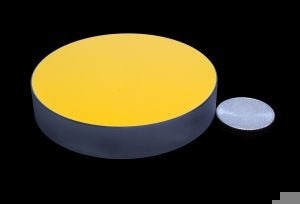
Gold Coated Mirror with glass base. Image Credit: Avantier Inc.
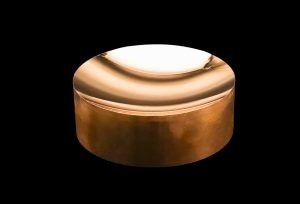
Polished Mirror with copper base. Image Credit: Avantier Inc.
Avantier’s Custom Reflective Optics
Reflective optics are crucial in multiple fields as they control light paths and meticulously reduce optical aberrations. From telescopes that capture the expansiveness of the universe to premium cameras and scientific tools, these systems play a critical part in developing technology and research.
Avantier has over 20 years of experience designing and manufacturing in-stock and custom reflective optics in North America. Their custom reflective coatings provide superior reflectivity, uniformity, durability, and longevity, ensuring their products meet the highest performance and reliability standards.
Trust the quality and precision of Avantier’s reflective optics for all sophisticated optical use cases.

This information has been sourced, reviewed, and adapted from materials provided by Avantier Inc.
For more information on this source, please visit Avantier Inc.